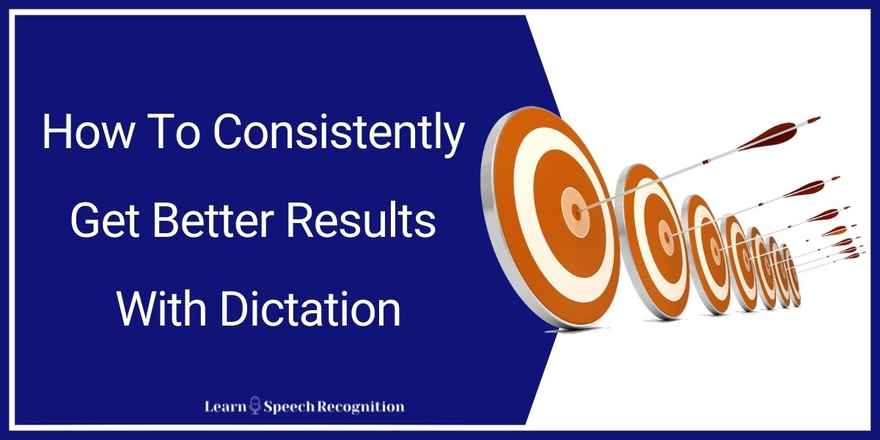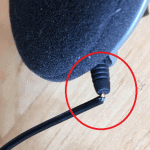How to consistently get better results with dictation

This blogpost from a while ago inspired my to create a podcast episode. The content is not exctly the same, but has overlap. So if you prefer listening to podcasts over reading blog posts, give it a listen here or find The Speech Recognition Podcast in your favorite player.
Are you struggling to get consistently good recognition results when dictating? Read what problems this buyer of my course on dictation with Apple Voice Control for the Mac encounters when dictating.
I've enjoyed your course and gotten lots of value. However I am struggling with dictation technique. As I’m getting the hang of it, dictating into a machine that doesn't allow for ums and ahs, mid-flight changes of mind over word use, or any lack of precision whatsoever can be frustrating… Whenever I do have moments of brilliance and string words together into long and coherent sentences it works brilliantly. And it always gets swear words right, for some reason. So my question is, is there anyway I can teach myself to dictate more accurately? I mainly write and respond to business emails which is quite tedious enough already. Look forward to your advice, if any :-)
I absolutely love that this customer reached out and shared their frustration with the inconsistent recognition results that they were getting.
Now this is someone who uses Apple Voice Control, but my remarks in this post are 100% equally as applicable to using Dragon speech recognition or, in fact, any voice recognition software.
I know for a fact that many people who use dictation software, including myself at times, have the same issue. So I am sharing the key points of my reply to this frustrated ‘dictator’ so that you can benefit from the inside and instructions and get more consistent recognition results.
Rule out sound quality causes
 I’m not going to go into audio quality too deeply in this post, but checking the audio is the first logical step when you are experiencing poor dictation recognition results.
I’m not going to go into audio quality too deeply in this post, but checking the audio is the first logical step when you are experiencing poor dictation recognition results.
Perhaps your microphone simply is not working well. This might be an issue with the inherent microphone quality, or it might be because the microphone broke. A damaged wire inside your microphone cable can cause intermittent poor results: sometimes the wire connects well and the mic works as it should, but sometimes the wire connection is iffy and the voice recognition suffers.
Another sound quality issue might be background noise. Perhaps you only experience poor recognition results when the air-conditioning is running. Or when the TV is on in the background. For my customer though, I am pretty sure that their analysis that the issue is with their dictation skill is correct.
Why recognition results sometimes are much worse
Sometimes it goes so well and then again the results are crappy... that can be a source of great frustration.
There is some good news: If you sometimes get great results when using speech recognition, you've already proven to yourself that you are absolutely capable of good dictation. Sometimes your results are brilliant, after all. Yay!
And then at other time your results are, let's say… less-than-brilliant. The email writer hits the nail on the head: speech recognition software has no tolerance for “ums and ahs, mid-flight changes of mind over word use or any lack of precision”.
Slow down to finish faster
The trick is to learn to recognise when you are having issues formulating your sentences or when you have difficulty deciding what exactly to express. And then, as soon as you recognise that your brain is in a less-than-brilliant phase, you need to hit the brakes on your dictation.
My customer’s analysis of the things that speech recognition does not tolerate, automatically tells us what we do need to do to get brilliant dictation: 
- Don’t say ‘uhm’ or ‘ah’
- Never hesitate or change your mind in the middle of a word or phrase
- Always be precise in your pronunciation of all the words, also the small ones (‘the’, ‘a’ etc)
Easier said than done, right? I feel your pain!
Even though I am a highly experienced 'dictationist', even for me the command "delete previous x words" is among my most used commands.
And just like you, I am sometimes struggling how to formulate my text. Especially when replying to a difficult email, or when I don't quite know what to say. However, I have learned to pause and gather my thoughts before opening my mouth and that pays off in how much editing I have to do after dictation
How to become better at dictating fluently
Sadly, there is no magic trick to immediately increase our skills in dictation. Especially in more challenging circumstances it can be hard to concentrate on not saying ‘uhm’, not hesitating in our deictation and be careful and precise in enunciating all the words.
There is hope!
Have you learned how to drive a car?
Then you may remember that when you started out, you needed all your concentration for operating the car. There's steering, braking, the gears, remembering the traffic rules and paying attention to the traffic around you.
It's a lot to do at the same time! With experience, though, you learned how to all that AND have a conversation a your passenger at the same time. But even as an experienced driver, it is not wise to drive when you are really distracted.
Let's imagine something dramatic, e.g. if your passenger is your ex-spouse and you are having a fight about one of your kids’ irresponsible habits. It’s an extreme example, but you can easily imagine that your driving skills would suffer. Despite your experience, inn the end driving a car is still something that requires your concentration. The more brainpower you are using for other things, the less well you drive.
Dictation is a skill similar to driving a car
It is the same with dictation: early on, you need a lot of concentration for just doing proper dictation: pronouncing all the words a bit more carefully than when you are chatting. You also need to learn to remember dictating the punctuation marks, saying the commands for a new paragraph and stuff like that.
Fairly quickly, these skills will become more and more automatic. However, just like with driving, there will always be a point where your brain is so engaged in solving other problems, or so tired or upset that your dictation skills start to slip. When that happens, do the following.
- Realise that you would be struggling with this particular text whether you were dictating or typing by hand. This is true for me, for sure! My favourite key when I am typing a complicated email or struggling to keep a concentration is the Delete-key ? The realisation that you’d probably be struggling anyway can help you release the frustration of the feeling that ‘speech recognition software is not working for me’.
- Make sure that you think about what you are going to say before you’re actually saying it. There is absolutely no need to dictate incomplete sentences. As soon as you have the next 2 or 3 words clear in your mind, you can dictate them. However, you should stop dictating before you enter uncharted territory: the part of the sentence that you have not prepared in your mind.
Dictation is not rocket science
It is absolutely understandable that you are getting frustrated sometimes when the recognition results are disappointing.
But really, it is not rocket science. Dictation is a skill and you need to practice. And like with any skill, some people need to practice more and some people are 'naturals' and learn super quickly. I honestly hope that my ramblings and tips on this topic are helpful for you.
Perhaps you now understand somewhat why sometimes your dictation is brilliant and sometimes it is just plain crappy. The more you practice dictation with the right mindset, the more automatic it becomes.
If you take my tip to heart about slowing down and thinking before you start to dictate, you will find that your moments of brilliance will increase and your moments of frustration will become less and less.
Need some help with your dictation?
I've been training people to effectively work with speech recognition software for two decades now and I'd love to help you out. If you use Dragon Professional Individual (or Group) on Windows, you can join the Learn Dragon Online membership which has self paced courses, a forum and monthly live Q&A sessions.
If you are on a Mac, then check out the online course for Apple Voice Control.


0 comments
Leave a comment
Please log in or register to post a comment